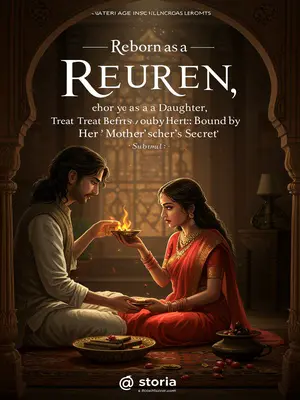Chapter 4: Fates Bound and Broken
In autumn, Eldest Sister was finally brought home. The former Lucknow beauty, once the envy of all, was now little more than skin and bone. Her plain cotton sari hung loosely from her frame, as if a light wind might carry her away. She bent low, touching her forehead to the marble, the dust sticking to her skin.
The silence in the hall was broken only by the hum of the ceiling fan and the distant cawing of crows. Even the servants stood a step further back, unwilling to meet anyone’s gaze.
Father sat high in the grand master’s chair, the hand that once stroked his moustache in praise now only circling the rim of his cup. At the eighth bow, Second Sister stepped forward to support her. Kneeling beside her, she held Eldest Sister’s hand, her touch gentle. "Papa, all the fault lies with Cousin Sharma; Eldest Sister already knows her mistake. Please forgive her."
Second Sister’s voice, usually playful, now trembled with sincerity. She dabbed at Eldest Sister’s forehead with a starched handkerchief, her gesture gentle, her eyes pleading.
She gently wiped the dust from Eldest Sister’s forehead. "Eldest Sister is too honest; if that leaves a scar, not only will her looks be marred, but there will be rumours that our family mistreats its daughters."
The weight of those words hung heavily in the air. In Lucknow, nothing spreads faster than a rumour about a noble family’s daughters.
At these words, both Father and Mother’s faces darkened. Eldest Sister seized the moment to grasp Second Sister’s hand, tears welling in her eyes. "From now on, I will be of one heart with my sisters and serve our parents well."
Her voice was hoarse from tears, yet her posture was still regal. In that moment, her submission was both defeat and a subtle challenge.
After this, though Eldest Sister returned to the inner chambers, she never regained Father’s favour. The less she was favoured, the harder she strove—practising calligraphy at dawn, dancing at midnight, keeping accounts at noon. Whenever she went out, the young men of Lucknow would toss flowers into her car, each vying for a glimpse of her beauty. Whenever Mother attended a party, she was always accompanied by two beauties—Eldest Sister, dazzling and composed; Second Sister, clever and understanding. One could recite poetry with a glance, the other could resolve awkwardness at the table with a word.
Their rivalry was the talk of every drawing room. Aunties at the beauty parlour would whisper, "Meera Kapoor’s eyes are sharper than a sword, but Ritu’s smile melts even the sternest hearts."
I faintly sensed that when the two walked together, their dupattas brushing, there was always an undercurrent of rivalry.
Even the servants would gossip, their voices low: "Dekho, dono behnein, ek saath, lekin dil mein toh kuch aur hi hai."
In the twelfth lunar month, the Rashtrapati Bhavan hosted a winter-flower-viewing banquet. Both sisters accompanied our parents into the palace. As the musicians played the Monsoon Melody, Eldest Sister spread her wide sleeves, fluttering like a startled swan, treading as if upon the moon. When her dance ended, the hall fell silent—even the President, seated upon the dais, forgot to drink his wine.
For a moment, the clink of glasses and the rustle of silk stilled. Only the distant ringing of temple bells echoed in my ears.
The chandeliers threw golden light on her, every step a story, every gesture a poem. I held my breath, knowing this was a moment that would be spoken of for years.
The President stroked the gold ring on his thumb, and after a long pause, said, "Mr. Kapoor, you have raised fine daughters—my own seem mere powder before them."
There was a hush, as if the entire hall waited for Father’s response. Even the aides at the side straightened their backs, sensing the importance of this moment.
Father immediately left his seat and knelt. "Sir, I am humbled. The princesses are as noble as the moon; my daughter is but a faint glow—how could she compare to the sun and moon?"
His humility was ritual, yet every word was chosen as carefully as a chess move. I saw the pride in his eyes even as he bowed.
The President was much pleased, bestowing ceremonial wine and asking Eldest Sister, "What is your name?"
His tone was warm, yet distant, as befits a ruler. All eyes in the hall rested on my sister.
"Sir, my name is Meera."
Her voice rang out, clear as a temple bell. I saw Father’s eyes glisten for just a moment.
"‘Meera’ is a gentle name; seeing your dance, the words ‘graceful and fluttering’ suit you better. Do you like them?"
The President’s smile lingered. The courtiers murmured their approval, nodding as if the bestowing of a new name was the greatest of honours.
Three days after receiving the President’s bestowed name, an official order arrived, appointing Eldest Sister as a consort. (For us, this was a mixed blessing: to be a 'consort' meant entering the palace as a companion to the ruler, respected but lacking the full privileges or succession rights of a 'princess.' It was prestige tinged with uncertainty—a step into the President’s household, but not its heart.) She knelt to receive the decree, her thanks as melodious as a koel’s song, her manner shy and reserved.
The palace staff presented her with sandalwood garlands, and the scent lingered in the hallway for hours. Even the chowkidar at the main gate remarked, "Kapoor sahab ki beti toh ab sarkar ki bhi izzat hai."
I stood behind her, watching the attendant’s white scarf recede, suddenly recalling that year in the northwest gazebo, when Eldest Sister also knelt, her back straight. But that time, her kneeling shattered a maiden’s dream. This time, her kneeling opened a path to splendour.
The memory was bittersweet, like tasting the first mango of the season—sweet, but with a sting that lingered.
Second Sister stepped forward, taking her hand and bowing gracefully. "Congratulations, Sister, on winning the President’s favour. This is the glory of our Kapoor family."
Ritu’s voice rang out, confident and measured, her smile broad. Yet, beneath the words, I sensed a challenge, an invisible line drawn in the sand. Her hand lingered too long on the peacock shawl, betraying her inner turmoil.
Eldest Sister smiled at the corners of her mouth, but in her eyes was a faint chill. "Second Sister, you have been most attentive of late—be careful that cleverness may overreach itself."
Her words hung in the air like a warning. The rivalry between them, once hidden, was now clear as sunlight on a winter’s day.
Second Sister was not angered, smiling as she tucked a stray lock behind Eldest Sister’s ear. "Sister jests. In future, I will rely on your care."
She spoke lightly, her tone playful, but her fingers trembled just a little. The sisters’ games had moved from the garden to the palace, the stakes much higher now.
She smiled with a hint of pride, as if victory were assured. Of the two legitimate daughters of the Kapoor family come of age, one must enter the palace. A wise man plans from the start. Second Sister was certain of Father’s strategy of balance at court—one daughter as consort in the palace, a hidden piece by the President’s side; one to marry Prince Rajiv, paving the way for the future. Thus, whatever the winds of fortune, the Kapoor family would remain unshaken.
At home, the elders whispered, "Do betiyon ki shaadi sarkar mein ho, toh ghar ka chiraag kabhi bujhta nahin."
The President, though in his prime, was nearing forty; to enter the palace was only to become a consort. What Second Sister desired was the position of Princess Rajiv.
She wanted not just power, but the kind of legacy that would live on in history books, the stuff of stories told by future generations.













